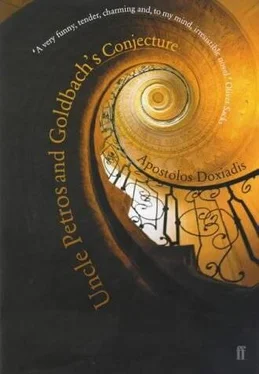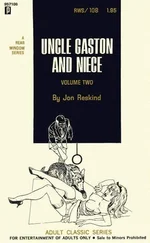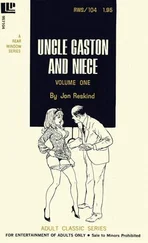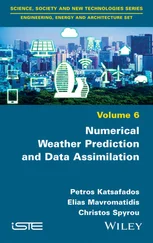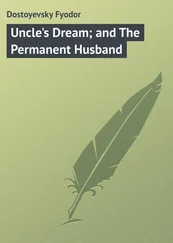'Unlucky? You mean unlucky to have chosen such a difficult problem?'
'No,’ he said, now looking totally amazed at my inability to grasp an obvious point. 'Unlucky – that, by the way, is a mild word for it – to have chosen a problem that had no solution. Weren't you listening?' He sighed heavily. 'By and by, my suspicions were confirmed: Goldbach's Conjecture is unprovable!'
'But how can you be so sure about it?' I asked.
'Intuition,’ he answered with a shrug. 'It is the only tool left to the mathematidan in the absence of proof. For a truth to be so fundamental, so simple to state, and yet so unimaginably resistant to any form of systematic reasoning, there could have been no other explanation. Unbeknown to me I had undertaken a Sisyphean task.'
I frowned. 'I don't know about that,’ I said. 'But the way I see it -'
Now, however, Uncle Petros interrupted me with a laugh. 'You may be a bright boy,’ he said, but mathematically you are still no more than a foetus – whereas I, in my time, was a veritable, full-blown giant. So, don't go weighing your intuition against mine, most favoured of nephews!' Against that, of course, I couldn't argue.
My first reaction to this extensive autobiographical account was one of admiration. Uncle Petros had given me the facts of his life with remarkable honesty. It wasn't until a few days later, when the oppressive influence of his melancholy narrative diminished, that I realized everything he'd told me had been beside the point.
Remember that our meeting had been initially arranged so that he could try to justify himself. His life's story was only relevant to the extent that it explained his atrocious behaviour, assigning me in all my adolescent mathematical innocence the task of proving Goldbach's Conjecture. Yet, during his long narrative he had not even touched on his cruel prank. He'd ranted on and on about his own failure (or maybe I should do him the favour of calling it 'bad luck'), but about his decision to turn me away from studying mathematics and the method he had chosen to implement it, not a single word. Did he expect me automatically to draw the conclusion that his behaviour to me was determined by his own bitter life-experiences? It didn't follow: although his life story was indeed a valid cautionary tale, it taught a future mathematician what pitfalls to avoid so as to make the most of his career – not how to terminate it.
I let a few days go by before I went back to Ekali and asked him point-blank: could he now explain why he had attempted to dissuade me from following my inclination.
Uncle Petros shrugged. 'Do you want the truth?'
'Of course, Uncle.' I said. 'What eise?'
'All right then. I believed from the first moment – and still do, I'm sorry to say – that you have no special gift for great mathematics.'
I became, once again, furious. 'Oh? And how on earth could you have known that? Did you ask me a single mathematical question? Did you ever set me a problem to solve, other than the unprovable, as you termed it, Conjecture of Christian Goldbach? I certainly hope you don't have the nerve to tell me that you deduced my lack of mathematical ability from that!'
He smiled, sadly. 'You know the popular saying that the three conditions impossible to conceal are a cough, wealth and being in love? Well, to me there is a fourth: mathematical gift.'
I laughed contemptuously. 'Oh, and you can no doubt identify it at a glance, eh? Is it a look in the eye or a certain je ne sais quoi that betrays to your ultra-fine sensibility the presence of mathematical genius? Can you perhaps also determine one's IQ with a hand-shake?'
'Actually there is an element of that "look in the eye",’ he replied, ignoring my sarcasm. 'But in your case physiognomy was only a small part of it. The necessary – but not sufficient, mind you – precondition for supreme achievement is single-minded devotion. If you had the gift that you yourself would like to have had, dear boy, you wouldn't have come asking for my blessing to study mathematics; you would have gone ahead and done it. That was the first tell-tale sign!'
The more he explained himself, the angrier I got. 'If you were so certain I wasn't gifted, Uncle, why did you put me through the horrific experience of that summer? Why did I have to be subjected to the totally unnecessary hurmliation of thinking myself a near-idiot?'
'But, don't you see?' he answered merrily. 'Goldbach's Conjecture was my security! If by some remote chance I'd been wrong about you and, in the most unlikely instance, you were indeed earmarked for greatness, then the experience wouldn't have crushed you. In fact it would not have been at all "horrific", as you significantly termed it, but exciting and inspiring and invigorating. I gave you an ultimate trial of determination, you see: if, after failing to solve the problem I'd set you – as, of course, I knew you would – you came back eager to learn more, to persist in your attempt for better or for worse, then I'd see you might have it in you to become a mathematician. But you… you weren't even curious enough to ask the solution! Indeed, you even gave me a signed declaration of your incompetence!'
The pent-up anger of many years now exploded. 'Do you know something, you old bastard? You may once have been a good mathematician, but as a human being you rate zero! Absolutely, totally zilch!'
To my surprise, this opinion was rewarded with a huge, hearty smile. 'On that, most favoured of nephews, I couldn't agree with you more!'
A month later I returned to the United States to prepare for my Senior year. I now had a new room-mate, unrelated to mathemarics. Sammy had meanwhile graduated and was at Princeton, already deeply involved in the problem that would in due course become his doctoral dissertation – with the exotic title: "The orders of the torsion subgroups of \Omega_{n} and the Adams spectral sequence'.
On my first free weekend I took the train and went to visit him. I found him quite changed, much more nervous and irritable than I had known him in the year of our association. He'd also acquired some kind of facial tic. Obviously, the torsion subgroups of \Omega_{n (whatever they were) had taken their toll on his nerves. We had dinner at a small pizza place across from the university and there I gave him a shortened version of Uncle Petros' story, as I'd heard it from him. He listened without once interrupting for question or comment.
After I was finished, he summed up his reaction in two words: 'Sour grapes.'
'What?'
'You should know – Aesop was a Greek.'
'What's Aesop got to do with it?'
'Everything. The fable of the fox who couldn't reach a yummy bunch of grapes and therefore decided they were unripe anyway. What a wonderful excuse your uncle found for his failure: he put the blame on Kurt Gödel! Wow!' Sammy burst out laughing. 'Audacious! Unheard of! But I have to grant it to him, it is original; in fact it's unique, it should go into some book of records! Never before has there been a mathematician seriously attributing his failure to find a proof to the Incompleteness Theorem!'
Although Sammy's words echoed my own first doubts, I lacked the mathematical knowledge to understand this immediate verdict.
'So, you think it's impossible that Goldbach's Conjecture is unprovable?'
'Man, what does "impossible" mean in this context?' Sammy sneered. 'As your uncle correctly told you, there is, thanks to Turing, no way of telling with certainty that a statement is a priori unprovable. But if mathematicians involved in advanced research started invoking Gödel, no one would ever go near the interesting problems – you see, in mathematics the interesting is always difficult. The Riemann Hypothesis has not yielded to proof after more than a Century? A case of application of the Incompleteness Theorem! The Four Colour Problem? Likewise! Fermat's Last Theorem still unproved? Blame it on evil Kurt Gödel! No one would ever have touched Hilbert's Twenty-three Problems; [14]indeed it's conceivable that all mathematical research, except the most trivial, would come to an end. Abandoning the study of a particular problem because it might be unprovable is like… like…' His face lit up when he found the appropriate analogy. 'Why, it's like not going out in the street for fear that a brick might fall on your head and kill you!'
Читать дальше
